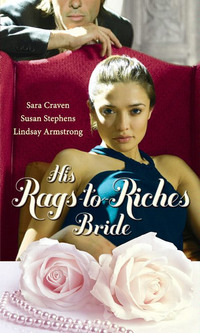
Полная версия
His Convenient Marriage

His Convenient Marriage
Sara Craven

www.millsandboon.co.uk
Former journalist SARA CRAVEN published her first novel ‘Garden of Dreams’ for Mills & Boon in 1975. Apart from her writing (naturally!) her passions include reading, bridge, Italian cities, Greek islands, the French language and countryside, and her rescue Jack Russell/cross Button. She has appeared on several TV quiz shows and in 1997 became UK TV Mastermind champion. She lives near her family in Warwickshire – Shakespeare country.
Table of Contents
Cover
Title Page
About the Author
CHAPTER ONE
CHAPTER TWO
CHAPTER THREE
CHAPTER FOUR
CHAPTER FIVE
CHAPTER SIX
CHAPTER SEVEN
CHAPTER EIGHT
CHAPTER NINE
CHAPTER TEN
CHAPTER ELEVEN
Endpage
Copyright
CHAPTER ONE
‘CHESSIE—oh, Chess, you’ll never guess what they’re saying in the post office.’
Francesca Lloyd frowned slightly, but her attention didn’t waver from her computer screen as her younger sister burst into the room.
‘Jen, I’ve told you a hundred times, you’re not supposed to come to this part of the house, and especially not during working hours.’
‘Oh, nuts.’ Jenny perched on a corner of the big desk, pushing aside some of the neat piles of paper to make room for herself. ‘I simply had to see you. Anyway, The Ogre won’t be back from London for hours yet,’ she added airily. ‘I checked that his car wasn’t there before I came round.’
Chessie’s lips tightened. ‘Please don’t call him that. It’s neither kind nor fair.’
‘Well, nor is he.’ Jenny pulled a face. ‘Besides, you may not need this job for much longer.’ She took an excited breath. ‘I heard Mrs Cummings telling the post mistress that she’s had instructions to open Wenmore Court again. And that means that Alastair’s coming back at last.’
Chessie’s fingers stilled momentarily on the keyboard. For a moment her heart leapt, painfully—almost brutally.
She kept her voice even. ‘Well, that’s good news for the village. The house has been closed up for far too long. But it won’t make much difference to us.’
‘Oh, Chess, don’t be silly.’ Jenny gave an impatient sigh. ‘It makes all the difference in the world. After all, you and Alastair were practically engaged.’
‘No.’ Chessie turned on her. ‘We were not. And you’ve got to stop saying that.’
‘Well, you would have been if his beastly father hadn’t sent him to business school in the States,’ Jenny retorted. ‘Everyone knows that. You were crazy about each other.’
‘And much younger, too.’ Chessie began typing again. ‘And a hell of a lot has happened since then. Nothing’s the same.’
‘Do you really think that would make any difference to Alastair?’ Jenny demanded scornfully.
‘I think it might.’ It still hurt to remember how the weekly letters had dwindled to one a month, and then petered out altogether before the end of their first year apart.
Since then, her only contact had been a brief note of condolence following her father’s death.
And if Alastair had known that Neville Lloyd had died, then he almost certainly knew the circumstances of his death, she thought, wincing.
‘God, you can be a real drag sometimes,’ Jenny accused. ‘I thought you’d be thrilled. I ran all the way home to tell you.’
‘Jen, we shouldn’t make assumptions.’ Chessie tried to speak gently. ‘After all, it’s been three years and a lot of water under the bridge. We’re not the same people any more, Alastair and I.’
There’d been a time when she’d rejoiced in those three words, she thought sadly. When they’d had meaning—even a future …
She squared her shoulders. ‘And now I’ve got to get on. Please don’t let Mr Hunter come back and catch you here again.’
‘Oh, all right.’ Jenny slid mutinously off the desk. ‘But how great it would be if Alastair asked you to marry him. Imagine being able to tell The Ogre what to do with his rotten job.’
Chessie stifled a sigh. ‘It is not a rotten job,’ she returned levelly. ‘It’s good, and well paid. It keeps food in our mouths, and a roof over our heads. And it allows us to go on living in our old home.’
‘As servants,’ Jenny said with intense bitterness. ‘Big deal.’ And she went out, slamming the door behind her.
Chessie sat very still for a moment, her face troubled. It was disturbing that even after all this time, Jenny had not been able to come to terms with the admittedly devastating change in their circumstances.
She could not seem to cope with the fact that Silvertrees House no longer belonged to them—or that the only part of it they were entitled to occupy was the former housekeeper’s flat.
‘Yet, why not?’ Chessie asked herself, wryly. ‘After all, that’s what I am—the housekeeper.’
‘I don’t want, or need, a lot of staff,’ Miles Hunter had told her at that first, fraught interview. ‘I require the house to be run efficiently, and without fuss, plus secretarial support.’
‘Meaning what, precisely?’ Chessie looked impassively back at her potential employer, trying to weigh him up. It wasn’t easy. His clothes, casually elegant, were at odds with the harshly etched lines of his face, accentuated by the scar that ran from his cheekbone to the corner of his unsmiling mouth. The cool drawl gave nothing away, either.
‘I use a very old portable typewriter, Miss Lloyd. I always have, but my publishers now require my manuscripts on computerised disks. I presume you can handle that?’
She nodded wordlessly.
‘Good. On the domestic side it will be up to you what additional assistance you require. I imagine you’ll need a daily help at least. But I insist on peace and quiet while I’m writing. I also value my privacy.’
He paused. ‘I’m aware this may be difficult for you. After all, you’ve lived at Silvertrees all your life, and you’re used to having the free run of the place. That, I’m afraid, can’t happen any more.’
‘No,’ Chessie said. ‘I—I can see that.’
There was another brief silence. ‘Of course,’ he said, ‘you may not wish to take the job on, but your lawyer felt it could solve a number of problems for both of us.’
The blue eyes were vivid against the deep tan of his thin face. ‘So, how about it, Miss Lloyd? Are you prepared to sacrifice your pride, and accept my offer?’
She ignored the note of faint mockery in his voice. ‘I can’t afford pride, Mr Hunter. Not with a young sister to support, and educate. I’d be more than grateful for the job, and the accommodation.’ She paused. ‘And we’ll try not to impinge on your seclusion.’
‘Don’t just try, Miss Lloyd. Succeed.’ He drew the file on the desk in front of him towards him, signalling the interview was ending. As she rose he added, ‘I’ll get my lawyers to draw up the necessary lease, and contract of employment.’
‘Is that really necessary?’ There was dismay in her voice. ‘It sounds a bit daunting. Couldn’t we have some kind of—gentleman’s agreement?’
His mouth seemed to twist harshly, or was it just the scar that gave that impression?
‘I’ve never been a gentleman, Miss Lloyd,’ he remarked. ‘And appearances are against you, too. I think it better to put things on a businesslike footing from day one—don’t you?’
And that, Chessie thought drearily, had been that. She was allowed to occupy the former housekeeper’s flat, with Jenny, for a peppercorn rent, as long as she continued to work for Miles Hunter.
At the time, desperate as she had been, bleak with guilt and grief over her father, it had seemed a lifeline. Too good a proposition to turn down.
Now, with hindsight, she wondered if she should have refused. Taken Jenny and herself far away from old memories—old associations.
But that would have meant finding a new school for Jenny just before an important exam year, and she’d been loth to create any more disruption in her sister’s life.
And at first it had seemed worth it. Jenny had done well, and was expected to go on to university in due course. She’d get a student loan, but it would still mean all kinds of extra expenditure.
So Chessie seemed contracted to several more years of transferring Miles Hunter’s starkly exciting thrillers onto the computer, and keeping his home running like the clockwork he demanded.
It had not, she reflected, been the easiest of rides. As she’d suspected at that first meeting, he wasn’t the easiest person in the world to work for. He expected consistently high standards, and could be icily sarcastic and unpleasant if these were not met, as several of the daily helps who’d come and gone could vouchsafe.
But while Chessie had adhered strictly to her own territory outside working hours, Jenny had not always been so scrupulous.
She’d made it plain she regarded Silvertrees’ new owner as little more than an interloper in what was still her own home, and this had led to trouble, and almost confrontation, on more than one occasion. And this had led to her coining the resentful nickname ‘The Ogre’ for Miles Hunter.
Chessie pushed back her chair, and wandered over to the window, beset by sudden restlessness.
Jenny could be disturbingly intolerant at times, she thought ruefully. It was true that she’d found her father’s disgrace and subsequent death traumatic in the extreme, but that was no longer a valid excuse. But her young sister bitterly resented the collapse of her comfortable, cushioned life.
She wanted things back the way they were—and that was never going to happen.
I’ve accepted it, Chessie thought sadly. Why can’t she?
And now Alastair might be returning and Jenny had seized on this as a sign that their circumstances were about to change for the better in some miraculous way.
Chessie sighed under her breath. Oh, to be that young and optimistic again.
As she had been once—when she and Alastair had been together, and the world and the future had seemed to belong to them.
As a first love, she supposed, it had been pretty near idyllic. A summer of walks, and car rides; of swimming and playing tennis, and watching Alastair play cricket. Of kisses and breathless murmurs. And promises.
In retrospect, all very sweet. And absurdly innocent.
Alastair had wanted her. There was little doubt about that, and to this day she didn’t know why she’d held back. Maybe it had been some unconscious reluctance to take the step that would have left her girlhood behind for ever, and made her a woman. Or, more prosaically, perhaps it had been the fear that it had only been her body that he’d really wanted. And that, having made the ultimate commitment, she would have lost him.
‘A man will tell you anything, darling, if he’s trying to get you into bed.’ Linnet’s husky voice, cloying as warm treacle, came back to haunt her. ‘Don’t make it too easy for him.’
Chessie had reacted with distaste at the time. But maybe the words had stuck just the same. Like so many of Linnet’s little barbs, she reflected ruefully.
And if the Court really was being re-opened, that would mean that Linnet would be back too, proving that every silver lining had a black cloud hovering.
In a way, it had been Linnet who had unwittingly drawn Chessie and Alastair together originally.
Sir Robert Markham, like Chessie’s father, had been a widower for several years. It had been popularly assumed in the village that if he remarried, his choice would be Gail Travis, who ran the local kennels, and whom he’d been escorting to local functions for the past year.
But one night at a charity ball he’d seen Linnet Arthur, an actress who, up to then, had made an erratic living from modelling, bit parts in soap operas, and playing hostess on daytime television game shows. Linnet, with her mane of blonde hair, perfect teeth, endless legs and frankly voluptuous body, had been decorating the tombola. And suddenly poor Mrs Travis had been history.
After an embarrassingly short courtship, Sir Robert had married Linnet, and brought her down to the Court.
The shock waves had still been reverberating when he’d given a garden party to introduce her to the neighbourhood. And Alastair, standing like a statue in the background, had clearly been the most shocked of all.
He’d disappeared during the course of the afternoon, and Chessie had found him sitting under a tree by the river, throwing stones into the water. She’d been about to creep away, convinced he’d wanted to be alone, but his face, white with outrage and misery, had stopped her in her tracks.
Over six feet tall, with chestnut hair, and good looks to die for, Alastair, three years her senior, had always been Chessie’s god.
Somehow, she’d found the courage to say, ‘Alastair, I’m so sorry.’
He glanced up at her, his brown eyes glazed with pain. ‘How could he?’ he burst out. ‘How could he have put that—bimbo in my mother’s place? God, Chessie, she even brings bimbos into disrepute.’
To her horror, Chessie found herself struggling not to laugh. Alastair noticed, and his own mouth twitched into a reluctant grin. After that Linnet was always referred to between them as ‘The Wicked Stepmother’, and they spent many enjoyable hours slagging off the time she devoted to her personal appearance, her horrendous schemes for redecorating the Court, firmly vetoed by Sir Robert, and her doomed attempts to establish herself as the lady of the manor.
After that, they devoted themselves to devising a range of eventual fates for her more ghoulish and grisly than even the Brothers Grimm could have imagined.
‘Thank God I’m going to university,’ Alastair declared eventually, with scornful resignation. ‘And I won’t be coming back for vacations, if I can help it.’
Chessie missed him when he went, but she was soon absorbed in her school work, planning ahead for a career in her father’s company.
It was three years before they encountered each other again. Chessie, newly returned from a month living as an au pair in France, had been asked to help on the white elephant stall at the church fête, held annually in the grounds of Wenmore Court, and one of the few village events with which the new Lady Markham sulkily allowed herself to be associated.
It was a blazingly hot afternoon, and Chessie was wondering when she could legitimately sneak off and go for a swim in the river, when Alastair halted beside the stall.
‘My God, Chessie.’ He was laughing, but there was another note in his voice too. ‘I’d hardly have known you.’
But I, she thought, the breath catching in her throat, I would have known you anywhere. Anywhere.
It was as if all her life until then had been geared for this one brilliant, unforgettable moment.
They stood there, smiling at each other, almost foolishly. Momentarily oblivious to everything and everyone around them. Then Alastair said quietly, ‘I’ll call you,’ and she nodded, jerkily, afraid of showing her delight too openly.
They were practically inseparable in those first weeks of reunion, talking endlessly. She’d just left school, and was preparing to join her father in the City the following September, initially as a junior dogsbody, styled personal assistant.
Alastair, they both presumed, would do the same—start learning the family electronics business from the bottom rung of the ladder.
The weather was hot, one perfect day spilling into another, and Chessie found herself spending a lot of time at the Court, where Linnet had managed to persuade her husband to install a swimming pool.
Until then, Chessie had been too insignificant for Lady Markham to notice, but she could hardly continue to ignore her when they were occupying adjoining sun loungers.
‘Hi,’ she drawled, eyes hidden behind designer sunglasses, and her spectacular figure displayed in a bikini one centimetre short of indecent. ‘So you’re Ally’s little holiday romance. How nice.’
Chessie bit her lip. ‘How do you do, Lady Markham?’ she returned politely, touching the languidly extended fingers.
‘Oh, Linnet—please.’ The red mouth curled into a smile. ‘After all, sweetie, we’re practically the same age.’
Back to the Brothers Grimm, Chessie muttered under her breath as she turned away.
She’d have preferred to avoid Linnet altogether during her visits, but this proved impossible. To Chessie’s embarrassment the older woman had immediately recognised the fact that she was still physically innocent, and enjoyed bombarding her with a constant stream of unwanted intimate advice, like poisoned darts.
But nothing Linnet could say or do had any real power to damage her happiness. Or her unspoken hopes for the future.
That came from a totally unexpected direction.
When Sir Robert announced that he was sending his son to business school in America, it was like a bolt from the blue. At first, Alastair seemed determined to fight his father’s decision, but when Sir Robert remained adamant, his mood changed to coldly furious acceptance.
‘Can’t you make him listen?’ Chessie pleaded.
‘It’s no use, darling.’ Alastair’s face was hard. ‘You don’t know my father when his mind’s made up like this.’
It was true that Chessie had only ever seen the genial, open-handed side of Sir Robert. This kind of arbitrary behaviour seemed totally out of character.
‘But I’ll be back, Chessie.’ He stared into space, his face set. ‘This isn’t the end of everything. I won’t allow it to be.’
And I believed him, thought Chessie.
She hoped it wasn’t some subconscious conviction that one day he’d return to claim her that had kept her here in the village. Because common sense told her she was crying for the moon.
If Alastair had been seriously interested in her, if it had been more than a boy and girl thing, then he’d have asked her to marry him before he’d gone to the States, or at least begged her to wait for him. She’d made herself face that a long time ago.
It had been obvious that everyone in the neighbourhood had been expecting some kind of announcement. And even more apparent that, once he’d departed, people had been feeling sorry for her. The sting of their well-meant sympathy had only deepened her heartache and sense of isolation.
As had the attitude of Sir Robert, who’d made it coldly clear that he’d regarded it as a transient relationship, and not to be taken seriously. While Linnet’s derisive smile had made Chessie feel quite sick.
She’d never realised before how much the other woman disliked her.
She’d wondered since whether Sir Robert, a shrewd businessman, had divined something about her father’s looming financial troubles, and had decided to distance his family from a potential scandal.
To widespread local astonishment, Sir Robert had announced his own early retirement, and the sale of his company to a European conglomerate. Following this, within a few weeks of Alastair’s departure, the Court had been closed up, and the Markhams had gone to live in Spain.
‘Joining the sangria set,’ Mrs Hawkins the post mistress had remarked. ‘She’ll fit right in there.’
But now, it seemed, they were coming back, although that didn’t necessarily mean that Alastair would be returning with them. That could be just wishful thinking on Jenny’s part, she acknowledged.
And Chessie hadn’t wanted to question her too closely about what she’d heard. For one thing, Jenny should not have been hanging round the post office eavesdropping on other people’s conversations. For another, Chessie didn’t want to give the impression she was too interested.
The burned child fears the fire, she thought wryly. She’d worn her heart on her sleeve once for Alastair already. This time, she would be more careful.
If there was a ‘this time …’
‘My God, Chessie, I’d hardly have known you.’
Was that what he’d say when—if—he saw her again?
Certainly, she bore little resemblance to the girl he’d known. The Chessie of that summer had had hair streaked with sunlight. Her honey-tanned skin had glowed with youth and health as well as happiness, and her hazel eyes had smiled with confidence at the world about her.
Now, she seemed like a tone poem in grey, she thought, picking at her unremarkable skirt and blouse. And it wasn’t just her clothes. The reflection in the window looked drab—defeated.
Yet any kind of style or flamboyance had not seemed an option in those hideous weeks between her father’s arrest for fraud and his fatal heart attack on remand.
She’d survived it all—the stories in the papers, the visits of the fraud squad, Jenny’s descent into hysteria—by deliberately suppressing her identity and retreating behind a wall of anonymity. Something she’d maintained ever since.
She’d expected to find herself a kind of pariah, and yet, with a few exceptions, people in the village had been kind and tactful, making it easy for her to adopt this new muted version of her life.
And working for Miles Hunter had helped too, in some curious way. It had been a tough and exacting time with little opportunity for recriminations or brooding.
In the last few months, she’d even managed to reach some kind of emotional plateau just short of contentment.
Now, thanks to Jenny’s news, she felt unsettled again.
She was about to turn back to her desk when she heard the sound of an engine. Craning her neck, she saw Miles Hunter’s car sweep round the long curve of the drive and come to a halt in front of the main door.
A moment later, he emerged from the driver’s seat. He stood for a moment, steadying himself, then reached for his cane and limped slowly towards the shallow flight of steps that led up to the door.
Chessie found she was biting her lip as she watched him. Her own current problems were just so minor compared to his, she thought, with a flicker of the compassion she’d never dared show since that first day she’d worked for him.
It was something she’d never forgotten—the way he’d stumbled slightly, getting out of his chair, and how, instinctively, she’d jumped up herself, her hands reaching out to him.
The blue eyes had been glacial, his whole face twisted in a snarl as he’d turned on her. ‘Keep away. Don’t touch me.’
‘I’m so sorry.’ She’d been stricken by the look, and the tone of his voice. ‘I was just trying to help …’
‘If I need it, I’ll ask for it. And I certainly don’t want pity. Remember that.’
She’d wanted to hand in her notice there and then, but she hadn’t because she’d suddenly remembered a very different exchange.
‘He had the world at his feet once,’ Mr Jamieson, their family solicitor, had told her when he’d first mentioned the possibility of a job, and staying on at Silvertrees. ‘Rugby blue—played squash for his county—award-winning journalist in newspaper and television. And then found himself in the wrong place at the wrong moment, when the convoy he was travelling with met a land-mine.’
He shook his head. ‘His injuries were frightful. They thought he’d never walk again, and he had umpteen skin grafts. But while he was in hospital recovering, he wrote his first novel The Bad Day.’
‘Since which, he’s never looked back, of course.’ Chessie spoke with a certain irony.
Mr Jamieson looked at her with quiet solemnity over the top of his glasses. ‘Oh, no, my dear,’ he said gently. ‘I think it likely he looks back a good deal—don’t you?’
And Francesca felt herself reproved.
She was back at her desk, working away, when Miles Hunter came in.








